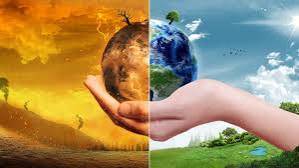Global warming stands as one of the most pressing challenges of our time, affecting ecosystems, economies, and human well-being on a global scale. This phenomenon, driven primarily by human activities, has triggered profound changes in our climate system, with far-reaching consequences that demand urgent attention and concerted action.
What is Global Warming?
Global warming refers to the long-term increase in Earth’s average surface temperature due to human activities, particularly the emission of greenhouse gases (GHGs) such as carbon dioxide (CO2), methane (CH4), and nitrous oxide (N2O). These gases trap heat in the Earth’s atmosphere, leading to the greenhouse effect—a natural process that is amplified by human activities, primarily through the burning of fossil fuels, deforestation, and industrial processes.
Causes of Global Warming
1. Burning of Fossil Fuels: The combustion of fossil fuels—coal, oil, and natural gas—for energy production, transportation, and industrial processes releases large quantities of CO2 into the atmosphere.
2. Deforestation: Forests act as carbon sinks, absorbing CO2 from the atmosphere. Deforestation reduces this capacity, leading to higher CO2 levels in the atmosphere.
3. Industrial Processes: Certain industrial activities release potent GHGs like methane and nitrous oxide, contributing to global warming.
4. Agriculture: Practices such as livestock farming produce methane emissions, while the use of synthetic fertilizers releases nitrous oxide.
Impacts of Global Warming
1. Rising Temperatures: Global average temperatures have risen significantly since the Industrial Revolution, leading to heatwaves and more frequent and intense heat extremes.
2. Melting Polar Ice and Glaciers: Higher temperatures cause polar ice caps and glaciers to melt, contributing to sea-level rise and threatening coastal communities.
3. Ocean Warming and Acidification: The oceans absorb much of the excess heat from global warming, leading to warmer and more acidic oceans, which endanger marine life and coral reefs.
4. Extreme Weather Events: Global warming intensifies extreme weather events such as hurricanes, droughts, floods, and wildfires, posing risks to human lives, infrastructure, and agriculture.
5. Ecosystem Disruption: Changes in temperature and precipitation patterns disrupt ecosystems, endangering species and altering habitats.
6. Human Health Impacts: Heat-related illnesses, respiratory problems from air pollution, and the spread of vector-borne diseases are exacerbated by global warming.
Global Efforts and Solutions
1. International Agreements: The Paris Agreement, adopted in 2015, aims to limit global warming to well below 2 degrees Celsius above pre-industrial levels, with efforts to limit the temperature increase to 1.5 degrees Celsius.
2. Transition to Renewable Energy: Increasing the use of renewable energy sources such as solar, wind, and hydroelectric power can reduce dependence on fossil fuels and lower GHG emissions.
3. Energy Efficiency: Improving energy efficiency in buildings, transportation, and industry reduces energy consumption and GHG emissions.
4. Afforestation and Reforestation: Planting trees and restoring forests can enhance carbon sequestration and biodiversity conservation.
5. Adaptation Strategies: Developing and implementing strategies to adapt to the impacts of global warming, such as improving infrastructure resilience and water management.
6. Education and Awareness: Raising awareness about the causes and consequences of global warming fosters public support for climate action and encourages individual and collective efforts to mitigate emissions.
The Role of Technology and Innovation
Technological advancements play a crucial role in addressing global warming. Innovations in clean energy technologies, carbon capture and storage (CCS), sustainable agriculture practices, and climate-resilient infrastructure contribute to mitigation and adaptation efforts. Governments, businesses, and research institutions worldwide are investing in research and development to accelerate the transition to a low-carbon economy and build climate resilience.
Conclusion
Global warming poses a significant threat to the planet and its inhabitants, requiring immediate and sustained action at local, national, and international levels. Addressing this challenge entails reducing GHG emissions, transitioning to renewable energy sources, conserving natural ecosystems, and enhancing resilience to climate impacts. By adopting comprehensive strategies and fostering global cooperation, we can mitigate the worst effects of global warming and build a sustainable future for generations to come
In conclusion, the urgency of addressing global warming cannot be overstated. It is a complex and multifaceted issue that demands collaborative efforts and decisive action across all sectors of society. By committing to sustainable practices and embracing innovation, we can mitigate the impacts of global warming and create a healthier and more resilient planet for future generations.


